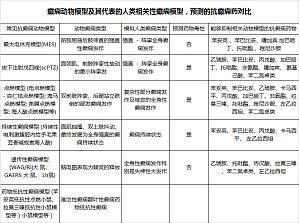疾病及处理
摘要癫痫是一种以大脑局部病灶突发性的异常高频放电并向周围组织扩散为特征的大脑功能障碍,同时可伴随短暂的运动、感觉、意识及自主神经功能异常。在研究癫痫病理生理改变及筛选抗癫痫药物时,所选择的癫痫模型起到十分重要的作用。癫痫的疾病模型可大致分为体外模型和整体模型。本期主要介绍:急性癫痫、慢性癫痫模型、遗传性癫痫模型以及癫痫抵抗性模型。一. 急性癫痫模型急性癫痫模型又称为痫性发作模型,常为单次处理即可诱发癫痫的一次急性 ...
Severe acute respiratory syndrome (SARS) coronavirus (CoV) contains a spike (S) protein that binds to a receptor molecule (angiotensin-converting enzyme 2; ACE2), induces membrane fusion, and serves as a neutralizing epitope. To study the functions of the S protein, we describe here the gen ...
Coronaviruses most often infect the respiratory or intestinal tract. Transmissible gastroenteritis virus (TGEV), a group 1 coronavirus, infects the porcine small intestine. Piglets up to the age of 3 weeks die from diarrhea caused by the viral gastroenteritis unless they are protected ...
We have developed a DNA assembly platform that utilizes the nonspecific, highly variable sequence signatures of type IIs restriction enzymes to assemble a full-length molecular clone of murine hepatitis coronavirus (MHV) strain A59. The approach also allows changes to be engineered i ...
The construction of coronavirus (CoV) infectious clones had been hampered by the large size of the viral genome (around 30 kb) and the instability of plasmids carrying CoV replicase sequences in Escherichia coli. Several approaches have been developed to overcome these problems. Here we de ...
We have developed a reverse genetics system for the avian coronavirus infectious bronchitis virus (IBV) in which a full-length cDNA corresponding to the IBV genome is inserted into the vaccinia virus genome under the control of a T7 promoter sequence. Vaccinia virus as a vector for the full-leng ...
Coronavirus reverse genetic systems have become valuable tools for studying the molecular biology of coronavirus infections. They have been applied to the generation of recombinant coronaviruses, selectable replicon RNAs, and coronavirus-based vectors for heterologous g ...
Targeted RNA recombination has proven to be a powerful tool for the genetic engineering of the coronavirus genome, particularly in its 3′ part. Here we describe procedures for the generation of recombinant and mutant mouse hepatitis virus and feline infectious peritonitis virus. Key to the t ...
The importance of monospecific antisera for the experimental analysis of viral proteins is undisputed. They make it possible to identify and analyze the target protein against a background of a large number of other proteins, either in whole fixed cells or in cell lysates. This chapter descri ...
Immunological detection of viruses and their components by monoclonal antibodies is a powerful method for studying the structure and function of viral molecules. Here we describe detailed methods for establishing monoclonal antibodies against severe acute respiratory synd ...
Infectious bronchitis virus (IBV), a group 3 coronavirus, produces three proteins (IBV E, IBV 3a, and IBV 3b) from subgenomic mRNA 3 during infection. IBV E, a viral envelope protein, plays a role in virus budding, possibly by altering membrane morphology at the virus assembly site. In addition to this r ...
For biophysical investigations on viral proteins, in particular for structure determination by X-ray crystallography, relatively large quantities of purified protein are necessary. However, expression of cDNAs coding for viral proteins in prokaryotic or eukaryotic syste ...
Intact, enveloped coronavirus particles vary widely in size and contour, and are thus refractory to study by traditional structural means such as X-ray crystallography. Electron microscopy (EM) overcomes some problems associated with particle variability and has been an importa ...
Chicken tracheal organ cultures (TOCs), comprising transverse sections of chick embryo trachea with beating cilia, have proved useful in the isolation of several respiratory viruses and as a viral assay system, using ciliostasis as the criterion for infection. A simple technique for the ...
Calculation of infectious viral titers represents a basic and essential experimental approach for virologists. Classical plaque assays cannot be used for viruses that do not cause significant cytopathic effects, which is the case for strains 229E and OC43 of human coronavirus (HCoV). An ...
In general, a whole virion serves as a simple vaccine antigen and often essential material for the analysis of immune responses against virus infection. However, to work with highly contagious pathogens, it is necessary to take precautions against laboratory-acquired infection. We have ...
The embryonated egg is a complex structure comprising an embryo and its supporting membranes (chorioallantoic, amniotic, yolk). The developing embryo and its membranes provide the diversity of cell types that are needed for successful replication of a wide variety of different viruse ...
Virus discovery based on cDNA-AFLP (amplified fragment length polymorphism) (VIDISCA) is a novel approach that provides a fast and effective tool for amplification of unknown genomes, e.g., of human pathogenic viruses. The VIDISCA method is based on double restriction enzyme processi ...
Severe acute respiratory syndrome is a novel human disease caused by a coronavirus of animal origin. Soon after the discovery SARS-CoV, several molecular assays were described for the detection of this virus. Of these, conventional and quantitative RT-PCR approaches were the primary too ...
Group 2a of the Coronaviridae family contains human and animal pathogens that include mouse hepatitis virus, rat coronavirus, human respiratory coronaviruses OC43 and the recently identified HKU1 strain, a newly recognized canine respiratory coronavirus, porcine hemagglut ...






